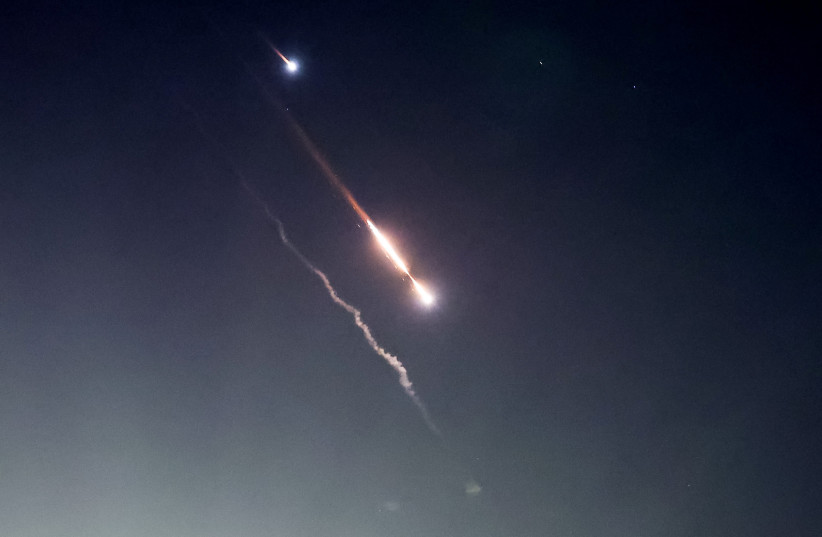The United Nations Security Council debated, but did not condemn, Iran’s missile and drone attack against the Jewish state early Sunday morning, as the United States and Israel called on it to do so.
“The Security Council must unequivocally condemn Iran’s aggressive actions and call for Iran and its partners and proxies to cease their attacks,” US Ambassador Robert Wood told the 15-member body, which held a special session on the attack late Sunday afternoon in New York.
But neither he nor any other country put forward a resolution to condemn Iran. No vote was taken on the matter and no statement was issued.
The UNSC president, Maltese Ambassador Venessa Frazier, told reporters after the meeting that the most important priority of the UNSC was on Gaza, where it wants to see a ceasefire, the unconditional release of hostages, and the entry and distribution of humanitarian aid to the enclave.
In terms of Iran, the message was clear, that this situation “should not escalate any further,” she said.

Wood speaks of the threat Israel faced during the Iranian attack
During the debate, Wood spoke of the danger Israel faced when it was under attack early Sunday morning.
“Iran’s intent was to cause significant damage and death in Israel,” Wood said as he described how Iran had launched over 300 munitions, including more than 100 ballistic missiles and land attack cruise missiles at Israel, as well as explosive unmanned aerial vehicles.
A coalition of armed forces from Israel, the United States, the United Kingdom, France, and Jordan shot down most of the missiles.
Wood charged that Iran violated multiple Security Council resolutions, by arming its proxy groups the Houthis in Yemen and Hezbollah in Lebanon, as well as by transferring the “Shahed one-way attack drones to Russia – the same drones it used in last night’s attacks against Israel.”
“Iran’s reckless actions not only posed a threat to populations in Israel but also to other UN member states in the region, including Jordan and Iraq,” Wood said.
He warned that “if Iran or its proxies take actions against the United States or further action against Israel, Iran will be held responsible.”
“In the coming days, and in consultation with other member states, the United States will explore additional measures to hold Iran accountable here at the United Nations,” Wood said.
He pledged that in the coming days, the US would explore measures by which to hold Iran accountable for its actions.
Israel’s Ambassador to the UN Gilad Erdan charged that Iran cared little for the lives of Muslims or its religion, noting that a seven-year-old Bedouin Israeli girl was seriously wounded in the attack and that the drones had gotten as far as the Temple Mount in Jerusalem.
He held up a video of the drones on top of al-Aqsa Mosque compound where the Dome of the Rock is located.
“This video shows how Israel intercepts Iranian drones above the Temple Mount and al-Aqsa Mosque,” he stated.
“To Iran, Israel’s annihilation and igniting the region is more important than Islamic holy sites,” Erdan said.
Iran’s Ambassador to the UN Amir Saeid Iravani said his country was responding to Israel’s April 1 strike in Damascus that killed seven Iranian military officials at what he said was part of his country’s embassy compound.
“It was precise and only targeted military objectives and carried out carefully to minimize the potential for escalation and prevent civilian harm,” he said.
He charged that the US, UK, and France, whose armed forces had worked with Israel, “had chosen once again to turn a blind eye to reality and overlook the root causes contributing to the current situation.
“In hypocritical behavior, these three countries falsely blamed and accused Iran without considering their own failures to uphold their international commitment to peace and security in the region,” Iravani said.
“They made unsuccessful attempts to use lies, manipulate the narrative, spread disinformation, and engage in a disruptive blame game. All the while, they deliberately disregarded Iran’s inherent rights to respond to the violation of a fundamental principle of international law, the inviolability of diplomatic representation and premises.”
He called on the UNSC to condemn Israel’s Damascus strike.
UN Secretary-General Antonio Guterres told the UNSC that the “Middle East is on the brink. The people of the region are confronting the real danger of a devastating full-scale conflict.
“Now is the time to defuse and de-escalate. Now is the time for maximum restraint,” he said.
“It’s time to step back from the brink. It is vital to avoid any action that could lead to major military confrontations on multiple fronts in the Middle East,” Guterres said.
